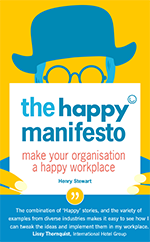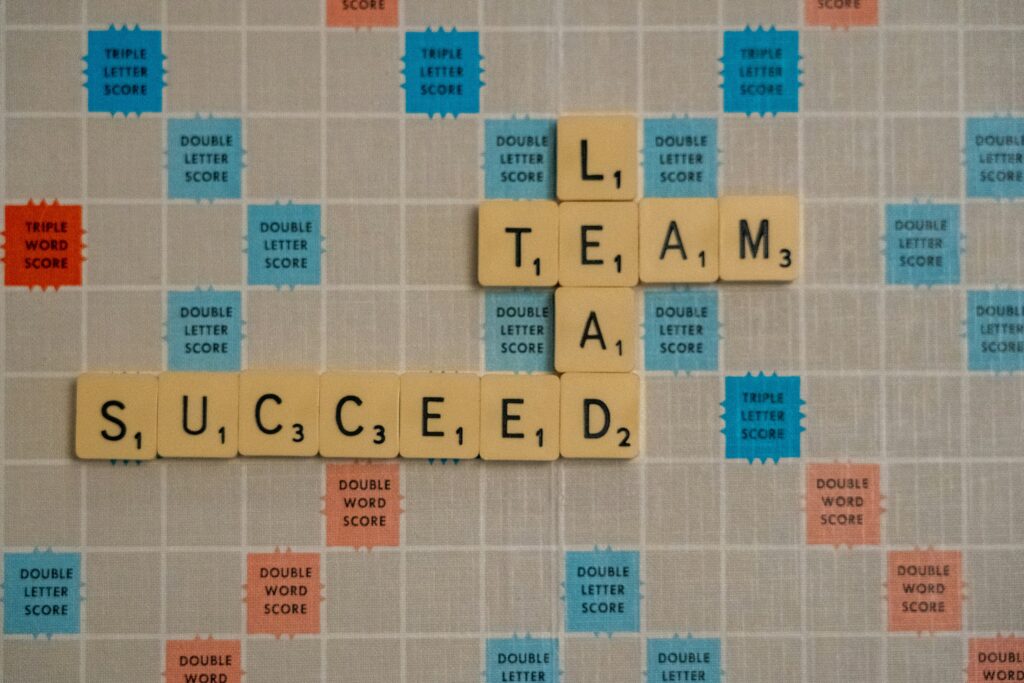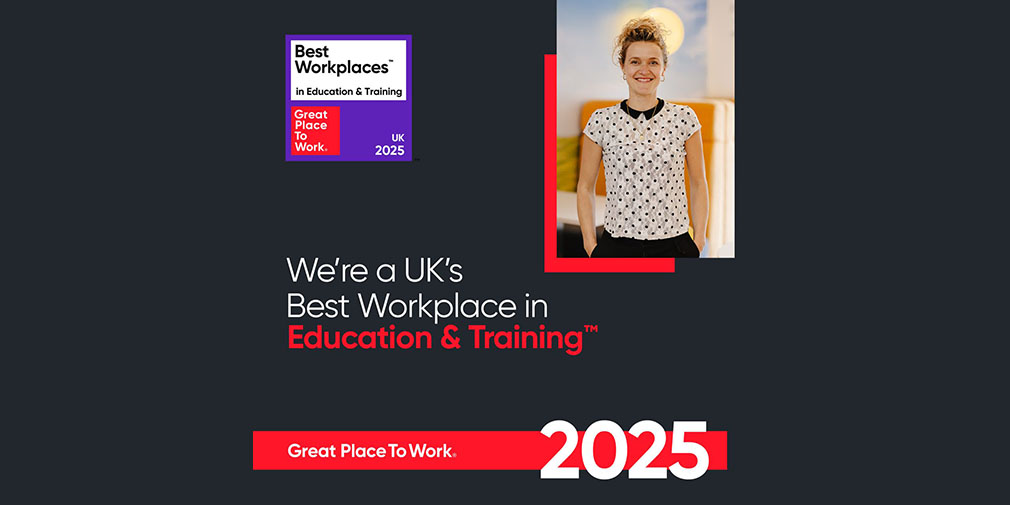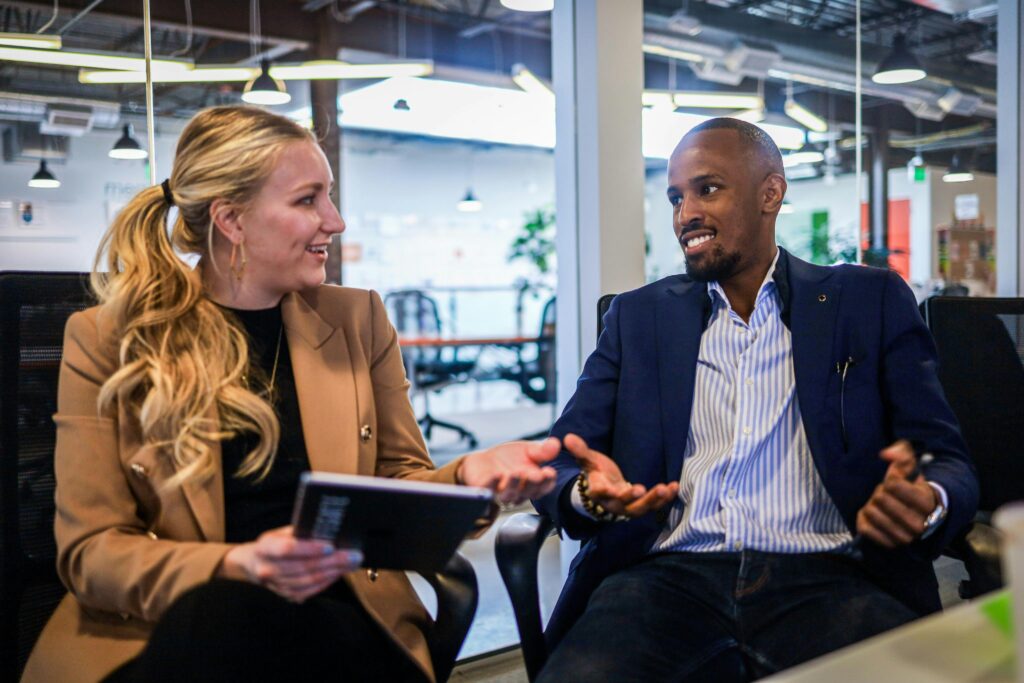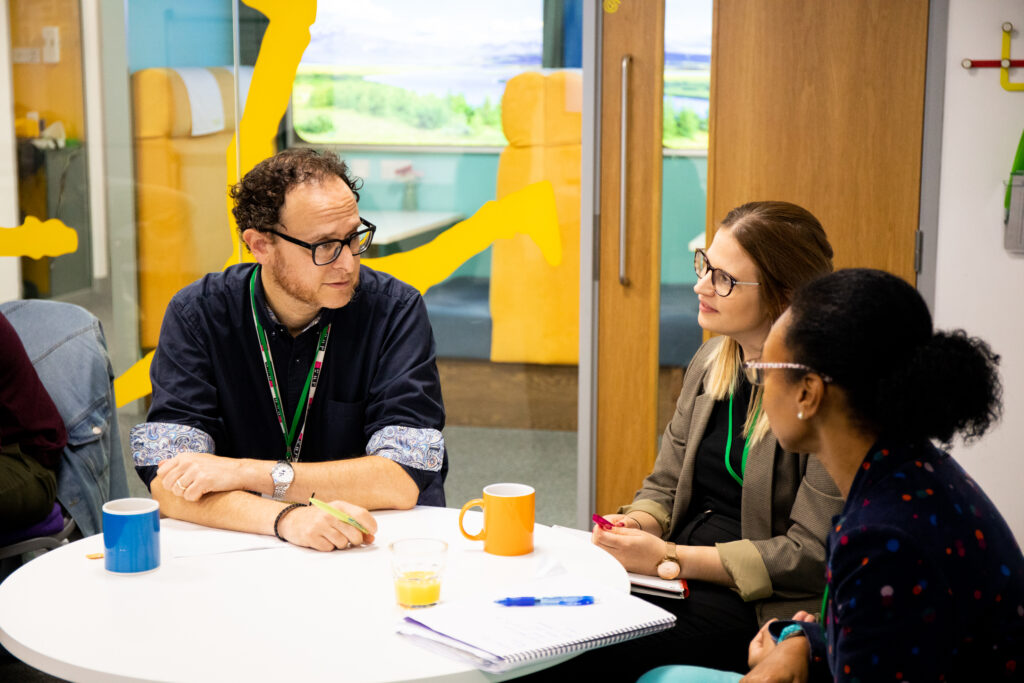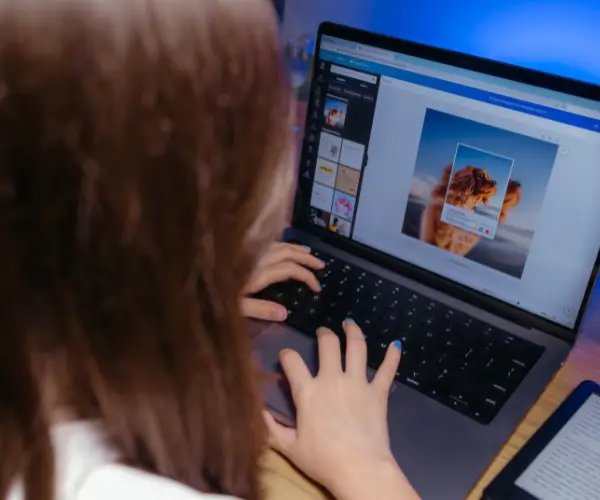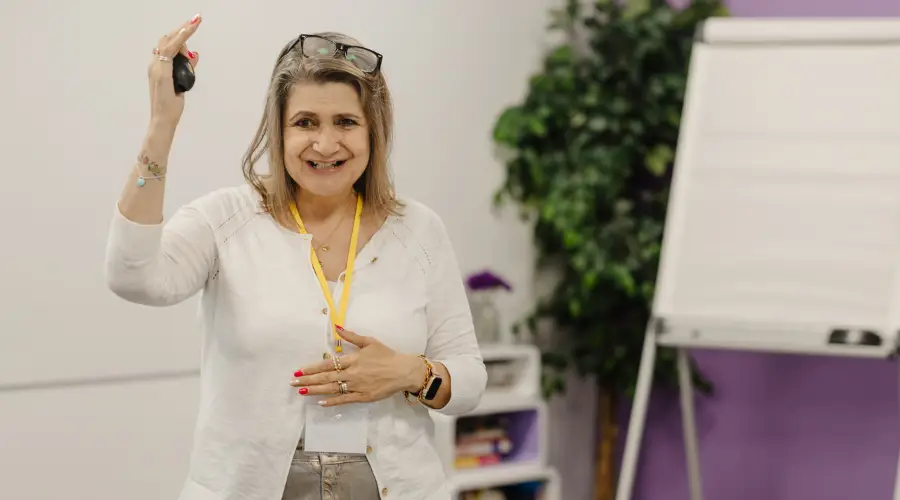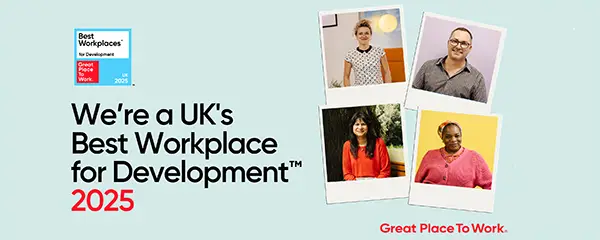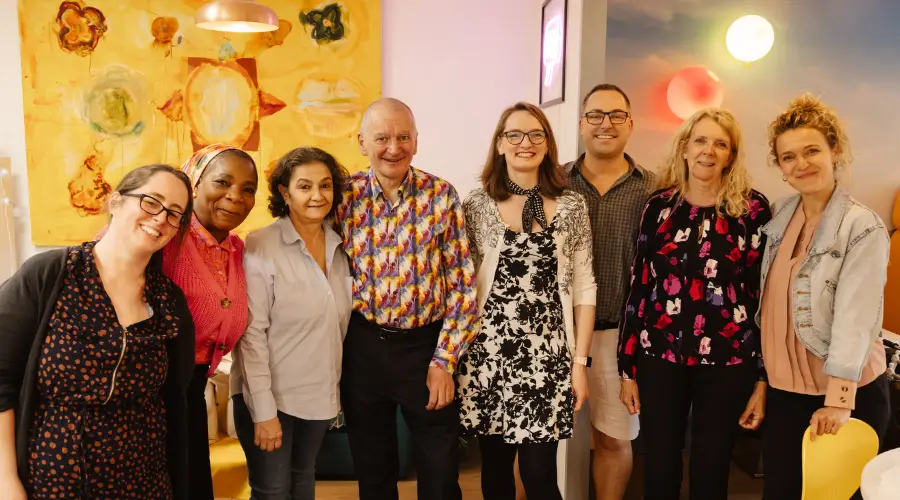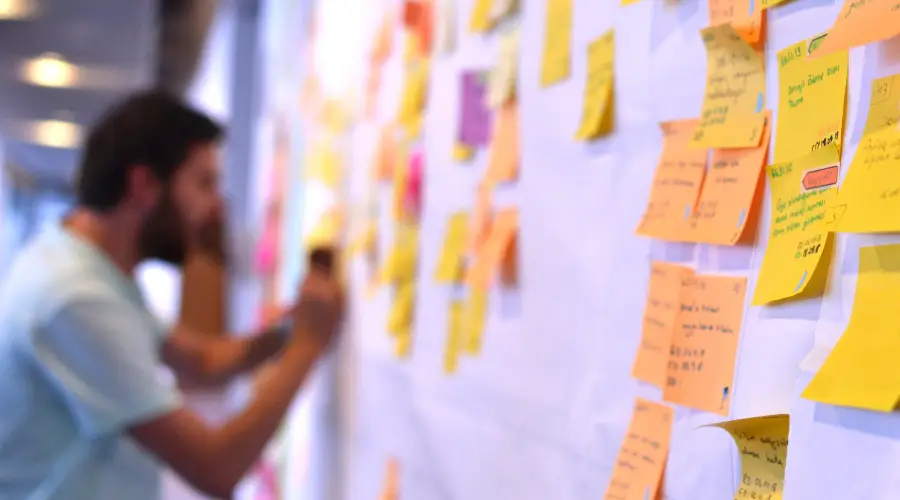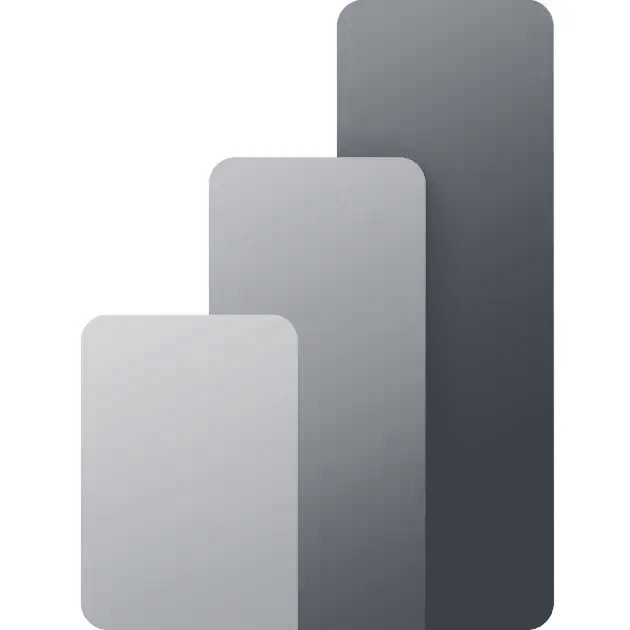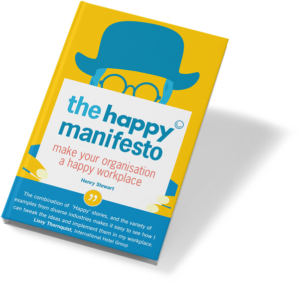So, I’m just coming to talk to you about culture and if you can maintain culture in a growing organisation. And I realized that I came to the Happy Workplace Conference in 2017, so seven years ago. So, it’s been really interesting. I found my slides actually yesterday, so the slides I presented seven years ago.
So, it’s been a really interesting process to reflect on some of the things we’ve done about putting in a happy workplace culture over those last seven years. It’s a really practical session, so I’m going to share lots of kind of things that we’ve done, some that have worked, some that haven’t. So, first of all, if I just tell you a little bit about who we are, so yeah, I’m the chief exec of TLC Talk, Listen, Change.
So, we’re a relationships charity. We’re based in Manchester, but we’re delivering services across the country. And we believe that every child or adult needs to be surrounded by a circle of safe, healthy, happy relationships. So, for us, that’s the relationship that you have with yourself, the relationship you have with a partner or ex Family or friends, school or work, or the local community.
And our belief is that when relationships are safe, healthy, happy, then levels of emotional wellbeing and personal resilience are higher. So the work that we do is counselling and therapy services, domestic abuse prevention, so particularly working with perpetrators of domestic abuse to change their behaviour, working with children and young people affected by domestic abuse, delivering family mediation services for couples who are separating, and delivering community projects across the UK.
So that’s who we are. So, we’re a relationships charity. You’ll hear me say safe, healthy, happy loads, I would think today, because it’s kind of inbuilt into me. But actually, as an organisation, we really believe that if we’re going to deliver really high-quality services, then our organisation has to be safe, healthy, happy for the people who work there.
And we really believe that if we’ve got a happy workplace, so people who love to come to work and love the job that they do, that’s when we get the best outcomes for people. So, my role, I think, in TLC, is to lead the work that we do across the country, but more importantly, is to lead the culture of the organisation.
So, believing that if we get that bit right, the rest of it really looks after itself. So, I’ll just tell you a little bit about our approach and some of the things that we’ve done. So just in terms of context when I came seven years ago, we just launched, so TLC is seven, seven years old. We launched on the 1st of April 2017.
We have grown in size, five times bigger. I don’t know what that’s, that’s not quadruple, I don’t know what that is, but five times bigger in seven years. So, we’ve gone from a turnover of 1 million to a turnover of 5 million. We’ve gone from a very small, family-based staff team where everybody knew each other, were in a really small office, everybody could kind of see each other.
Now a team of 145 staff, 70 volunteers, and working across the country. So, we don’t have the same kind of connections that we did seven years ago. So, over those seven years, we’ve learned a lot in terms of how we put culture in place. And this, the kind of slide, talks about what we think of as the TLC approach.
And I’m going to kind of bring out some of the things that we’ve done. So, our first thing is a clear mission. We want everybody in the organisation to feel aligned with what we do, whatever their role is. So, it doesn’t matter if you’re our finance officer, it doesn’t matter if you’re working in our domestic abuse prevention team, if you’re one of our board, you should feel that real alignment with our mission.
And our mission is safe, healthy, happy relationships. So, it’s really straightforward. We really believe that the organisation runs on having the right people. So, it was really important for us to understand what, what do we mean by the right people in TLC. So, over the last few years, particularly, we’ve done some work to understand what our organisational values are.
And that was a completely co-produced exercise. So that means it’s completely led by the people that we work with. So, our organisational team, but also the people that we work for. So, the people that we serve. And we came up with three organisational values in the same way. And I really had nothing to do with it.
So, the first I knew about our organisational values was our organisational conference two and a half, two and a half years ago. when they were presented by the team that worked on it. So, I had absolute trust that that team would come up with whatever the values were right for the organisation. So, I’m sure people have heard about preapproval, but we, we definitely work on the process of pre-approval.
People knew what they needed to, they knew what the aim was, but actually the path to get there was completely up to them. So, our three organisational values are safe, authentic, and person centred. And so then for the right people, what that means is people have got a values alignment with the organisation.
So, we recruit for values, and we train for skill. So, what that means is anybody who goes through a recruitment process at TLC, the key questions we’re asking you about are your values. So, we ask everybody to do a why video. So, it doesn’t matter which part of the organisation you’re in. And people might have heard Simon Sinek’s Golden Circle, which is about you start with why, so you start with purpose.
So whatever job you’re applying for at TLC, we ask you to send a video in about your personal why and why you are aligned with the organisation. Our organisation is full of people with lived experience, and I’d argue that everybody in this room has got lived experience of relationships. So, because we all have relationships all the time, but actually some of us have relationships that aren’t safe, healthy and happy, and our organisation is full of people with that experience.
We don’t ask people to share that lived experience unless they want to, because actually people need to feel psychologically safe if they want to share things. But actually, we do get an awful lot of people who share things at that why video. I will say we normally know by the end of that video if we think this candidate is a right fit for the organisation, but we then go through a more traditional recruitment process.
But all of our questions are around values. So, we will often ask, what’s the biggest mistake that you’ve made? Tell us about it. What did you learn from it? What’s the thing that gives you the most joy at work? How do you think you could do that here, having read the job description? So all of the questions are values based.
And that is really, really key to us, because it feels like if we’ve got an organisation with people with the shared values, actually the rest of it looks after itself. Saying that we do have managed management structure and reflecting on a speaker earlier on. I think it’s maybe more bloated than I thought it was.
And there’s maybe some work that we need to do. And, but we do manage performance. So, we expect that we really trust our team, but with kind of high trust and high support becomes we want really high performing teams and that’s really important to us. So, we’ve got a key performance indicator framework so KPI framework.
But quite different than other KPI frameworks, because our KPI framework is all around, how do you achieve the values of safe, authentic, and person centred in your daily job? So that’s what we’re looking for all the time. So, values run throughout the organisation in everything that we do. So that’s the first bit around having the right people.
The next kind of really big thing for us at TLC is having a nurturing approach. So really wanting to make the organisation somewhere that people want to come to work. So, there’s loads of things that we do. So, we have a series of staff network groups, and I’m sure loads of organisations have staff network groups.
So, we have a network group for people who are identified with a disability, people who are in our LGBTQIA+ community, people of colour. The difference may be in our organisation and some others is that the facilitator of that group is a paid role. So, somebody in our organisation doesn’t matter what level they are in the organisation, they identify in the community of the network group, but they’re paid at a senior leadership role reporting to myself as the chief executive for that network role.
So, the, Network attendance is completely confidential, so I meet with the network facilitators every four weeks. I’ve got no idea who attends those groups, but that’s an opportunity for those people in our organisation with protective characteristics. It may be facing discrimination in the world or in the organisation to have a safe space to call out the organisation or to challenge us or to encourage us to do things differently or celebrate the things that we’re doing well.
So that network attendance is really, really key, but we also want to make sure we want some kind of checks and balances because I Hope that I’m a really approachable leader, but you obviously don’t always know what your blind spots are. And so, one of the things that we do is enable our network facilitators to have a direct route to our board of trustees.
So that if there are any concerns in the organisation, that transparency, that kind of safe, authentic value is really important that they can report directly up. So that’s one of the things that we do in terms of a nurturing environment. Something else that we do, especially as an organisation that’s hybrid, we put an awful lot of time into curating and creating social spaces.
So, recognising that people are happy at work if they’ve got a friend at work. And actually, you do develop friendships by working next to somebody and doing the same job or doing a similar job. But you also develop friendships by having shared experiences and doing things that you love. So, we’ve got a whole series of kind of social groups.
So we have a book club, we’ve got a menopause support group, we’ve got a Dungeons and Dragons club that meets once a week, we’ve got a club that I think probably means going to the pub quite regularly, and we’ve got a whole series of clubs and social activities in the organisation. So, we talk a lot about friendship and wanting people to have somebody that they trust at work. Other things that we’ve done is we have a line management structure. So, people have one-to-ones, but we had all of our leaders and managers and aspiring managers across the organisation went on some happy training a couple of years ago and we came out of that and we ripped up our one-to-one form and that group proof the team had to go at redesigning.
What does a one-to-one look like in our organisation? So, line management one-to-ones happen every four to six weeks. The only thing that has to happen is that the two people have to come together and they have to talk about values and wellbeing. Anything else they talk about is great, and we encourage people to talk about career progression.
We encourage people to think around that KPI performance that’s being shared, but wellbeing and values are the two key things. We also encourage people to have that one to one in whatever format works for them. So, I know all of my one to ones with the people that I line manage normally now involve going for a walk because I’m a bit obsessed by my Fitbit and people are quite helpful at making me get, letting me get my steps in.
So, we’ll go out walking kind of regardless of the weather. And then we’ve got other people who will take the dogs out for a walk. We’ve got other people will do it in a cafe. That’s really important, that kind of connection between your line manager. So, for us, we’ve got that, it’s a relatively flat structure, but actually that relationship’s really important.
We also have a real commitment to flexibility. So, everybody in the organisation is encouraged to work flexibly. So, post COVID, when people came back in, we didn’t put any rules down about how often people have to be in offices. We trusted people to work during the pandemic. So, we trust people to work now in whatever way that works for them.
So, some people have got an office, some people choose to be in the office regularly, some people choose to be at home. Most people do a bit of both. But we’ve also got loads of people in the organisation with caring responsibilities. So, whether that’s with children or with older parents, we’ve got people who have got parents that they’re living with and they’re caring for.
We’ve got people who have got dogs who need walks every day. So, our agreement is actually we want you to do your job and you want to do your job really, really well, but we trust you to do the job in the way that works for you. So, if your child’s got an assembly, you don’t need to put the time off. You just go to your assembly.
That’s fine. You don’t miss a sports day. So that you’re in work. Of course, we expect really high performance, but we also want to recognise who you are as an individual. So that’s the other kind of key thing that we do.
I’m going to check my list. There’s so many things that we do. And the other thing that I was talking about on the table I was on before is that we have done a bit of a pilot of letting people choose their own job titles. So, I know that as the chief exec, I’m probably in a very privileged position.
Job titles don’t really matter to me, but that’s really easy to say, isn’t it? When you’re the top of an organisation, we’ve got some colleagues, particularly in our marketing and communications team, but their job title was really important to them when they were thinking about their career progression in the future. So, we went through a pilot a couple of years ago when we just said, look, this is the job, you’re happy with the job description, it doesn’t matter to us what you’re called. We did have a bit of a, a, a veto in case we’ve got any kind of voting by vote, vote based kind of arguments. But the, the, the marketing campaign therefore named themselves in a role that, what they thought was appropriate for them.
It doesn’t change what they do, but it changes for them the status that they feel like they’ve got in the organisation. But also, certainly for one of our colleagues, and this was her first job out of university, and she’d definitely come in thinking it was a short term job and her career goal was to be a graphic designer, so she wanted a job title that would open up, so she’s got a graphic design degree.
But she wanted a job that would open up a graphic design job in an agency. That was her plan. So, she’s called our creative design lead. That was the job title that she chose. She’s now been with us five years and has like let go of the idea of being a graphic designer and I think wants to stay with us.
But that was been a really kind of important thing. And I’ve got loads of others, but I’m conscious of time. But so that being a nurturing organisation, having a nurturing environment is really, really key for us. And the next bit of the TLC approach is around the necessary resources. So, we’re a charity.
Money is scarce. If anybody else is in charities, it is a hard place to be at the moment in terms of the expectation to do more with less and with rising demand and increasing complexity. It’s really, really tough. But we still want people to have the time and the resources that they need to do the job.
So, we went through a process a couple of years ago of evaluating all our salaries and working through, actually, how do we pay people when we compare to the sector? We’d love to pay at the top of the sector, but we just can’t afford to. So, we agreed as a board and as an organisation that we’d be really transparent about salaries and really transparent about our health and wellbeing offer.
And our commitment is to pay at the median of the sector, so we’re pretty much in the middle. What’s to be the absolute top of the sector in terms of total reward. So, we’ve got a generous annual leave entitlement. Everybody gets their birthday off. Everybody gets a health and wellbeing day a year.
Everybody gets a volunteering day. We have a series of lunch and learns where people are encouraged to put things on. So, we did a celebration for Diwali. We’ve just done a LGBTQ history month celebration. So, loads of thing which is saying we value you as an individual and therefore we’re really open about actually you probably could work somewhere else and get more money, but actually hopefully everything that we give you as a package makes you feel valued in this organisation.
So that’s our TLC approach. So clear mission, the right people, nurturing environment, and the necessary resources. And our, our, our absolute belief is that if we get that right, then more safe, healthy, happy relationships for the people that we’re here to serve just follows. The rest of it is easy, actually, as long as we get that bit right.
So, they’re the things that we’ve put in place in the last seven years. There’s, there’s a few others, but they’re the kind of main ones. So, I’m just going to pause for a second and ask you all a quick question around your own organisations, which is, so what are some specific aspects of your own workplace culture that contribute positively to your happiness and wellbeing.
I thought if you took a couple of minutes to talk about it and then we’ll come back, and then there’s a bit of space for questions but I’ll go on to what we’ve got planned next. All right. Thank you, everybody. I hope you have some things that you could identify. I’m conscious that there’s not long before you’ve got a few more sessions, and I want to make sure there’s time for everything.
So, I’m going to go straight on to my next bit. We’ll do one question. I’ll do another question for all of you, and then there’s an opportunity for a bit of Q& A at the end. So, I’ve just kind of gone through the things that we’ve done to grow. Up till now, but actually we’re at a pivotal moment in our organisation now.
So, we’ve just signed off our kind of growth plans for the next two years. And I talked about where we were seven years ago and where we are now. We’ve gone from being a Greater Manchester organisation, where we kind of almost touch each other in the room that we’re in, to now a national organisation that’s delivering safe, healthy, happy relationships across the country and we’ve got this is our strategic objectives for the next two years, and we’ve got really ambitious growth plans. So, recognising that the charity sector is in a really challenging place. As an organisation, we took the approach that we’re going to grow through that. We’re going to, so it’s diversify, develop, differentiate, deepen and dedicate.
We only sent them off last week, so they don’t roll off the tongue yet. But the key things are for us being ambitious and bright, constantly learning. celebrate who we are, focus on impact, and be true to our word. So that’s the things that we’re trying to do in the next two years in terms of our growth trajectory.
But I would say the bit that’s keeping me up at night is we’ve now got colleagues based in Bedfordshire and Hertfordshire, we’ve got colleagues based in Northumbria, we’ve got a new colleague just who’s joined us in Dublin. So actually, all those things that we did over the last seven years, a lot of those are based on the power of relationships and being able to bring people together.
So, what do we need to do to kind of maintain that culture and adapt that culture, but keep the heart of the culture as we grow into a fully national organisation? So, I suppose really to answer the question, I probably need to come back in another seven years and tell you how it’s gone, but I can tell you the things that we’ve got planned.
So as an organisation, we’ve really embraced the power of artificial intelligence. So, we, we can’t afford a really big back office. We haven’t got the money. But we’ve got some amazing people in our team around digital. So, we’re really embracing AI. But we’re embracing AI with a human centric approach.
So, our focus is that we want to use technology to enable more relationships to happen. And we want to use AI in a way that encourages our organisation to have a bit of fun with it. So, we’ve got an innovation hub that we’ve just launched. So, we talk a lot about it being okay to fail, but if you’re going to learn as an organisation, you have to try things, you know, you learn as a person, you have to try things.
But if you don’t, when you try things, you don’t always get them right. And actually, so it’s okay to fail. And we’ve got a no blame culture. So, our AI innovation hub is all around playing. It’s around playing with AI, testing AI, right. We’ve got a set of ethical principles, which say that if you ever one of the key ones is if you ever use AI in our organisation, you have to say that you’ve used AI.
So, people know that you can’t just use it as a kind of shortcut to do your job. And you can use it as a shortcut to do your job, which is absolutely fine, but if you do at least tell us that you have so that everybody knows that so that for some of the training that we’re doing is around kind of critical thinking, some of the things that actually may be now needed in AI enabled world.
But we’re starting to think around how we use AI to develop relationships across our organisation. So, we’re investing really heavily in terms of internal comms. So, we’re just about to recruit a new post, which is around internal comms and engagement. So that’s all around building the structures of engagement, some of which I’ve just talked about, but in a more structured way across the organisation in a way that works in a hybrid way.
So, you can come to our things in our office in Trafford and be there in person. But actually, if you’re working with us in Dublin, you’ve got equal access to the kind of relationship based culture that we’re trying to create. One of the things that we’ve got a little bit nervous about, and maybe I’m quite nervous about, is that I’ve been in the organisation from the beginning, which I’m really proud of, and I love the organisation.
But that means that I’m really accessible across the organisation. And I think one of the slides before was around being accountable to the people that you lead. And that’s definitely what it’s like in our organisation. You know, there’s a complete open door policy, but that’s really hard as you get bigger.
And when some people I just don’t know in the same way. So last year we had to go at doing, I offered everybody in the organisation a one-to-one chat with me. So, like 20 to 30 minute chat just to tell me what was going on for them. And that was really helpful, and I found out loads. But one of the things that I learned is it was really far too centred on me.
And actually, that’s not great and we want to focus on distributed leadership. So, one of the things we’re just implementing at the moment is a colleague shout out system. So, the opportunity to celebrate success for any colleagues that are linked to our values. So, we’ve been doing a bit of a trial of it and what happens, I like to think about competition before.
So, I’m personally really competitive and I’m really struggling with our shout out system because nobody’s given me a shout out. And I’ve given loads. But what happens is you give a shout out to a colleague. Choose which of the values it aligns to. It is a really beautiful kind of visible way, and it goes on a shout a digital shoutout wall so that everybody can see the shoutouts that their colleagues have got.
And it’s not a hierarchical system, so it’s for colleagues to give shout outs to each other. But the idea being that it also, it recognises things that are going well. It celebrates the successes, but it also does drive the organisational culture because most of us are a little bit competitive, and if your colleagues got a shout out you probably want to get one too.
So, it’s quite a nice way of doing that. It’s also digital, which really, really helps for us. The other thing that we’ve got coming up is that I talked around our KPI framework being values based, and it, and it is, but one of the things that we’ve realized is that people can say, I contribute to safe, healthy, happy relationships, and I can, they can say, yes, I understand our values are safe, authentic, and person centred.
They can’t always link the work that they do directly to our strategic objectives. And that’s also really important. We think if people are in that kind of organisational growth journey with us. So that’s the next stage of work that we’re trying to do is kind of some kind of visualization exercises of how you will overlay the values alongside the strategic objectives.
So that’s the other kind of the kind of key thing that’s happening. So that kind of some of the things that we’ve got plans, I would say, as an organisation, we, we try stuff all of the time. We like, we’re always kind of trying and we, we do celebrate failure. So, we’ve done a couple of things where people have stood up publicly.
We do a coffee and cake session once a month with me. So, either we would do a virtual one and we do an in person one. Sometimes it’s quite structured. So sometimes we talk about something that’s going on at TLC. Sometimes we talk about holidays or food shopping or what we’ve watched on telly. But in that we will quite often share failure.
So, I will quite often share things that I’ve tried that haven’t got, that I’ve gone wrong. Things that I’ve learned about myself, the kind of blind spots, they pick up almost 24, the blind spots that I’ve learned. Try to, we try and share that really, really openly to kind of normalize that it’s okay to fail in our organisation.
So that’s the only way we’re going to succeed as an organisation. So, there are some of the other things that we’ve kind of got planned over the next few months. The final one I was going to mention, because I think it came up somewhere else, was around the opportunity for individuals to come up with their own projects and lead their own projects.
So, our strategic objectives every year are set into an annual business delivery plan. So, an annual business plan, which is, you know, it’s fully transparent and accessible. Anybody can access it on our SharePoint system so that you can see the activities that are happening across the organisation. But what we’ve realized is it is quite top down in terms of the approach.
So, it’s done. We’ve got a strategic plan across the organisation. We’ve got departmental plans, we’ve got service plans, really transparent, but actually not always the easiest for somebody to influence what that is. So, we’ve been piloting for the last year an opportunity where anybody in the organisation can suggest their own project that goes into that organisational business plan.
It’s through our AI enabled technology hub, and there’s a few tests that people have to follow. So, it has to align with our values, that’s absolutely key. It has to align to our strategic objectives, and it has to contribute to our strategic risk register, because that’s the three tests that every other plan, every other project of our business plan goes through.
So, we thought it was important that it were the same ones. But as long as it passes those three tests, any member of staff across the organisation is can now suggest the project that they want to be part of the organisational business plan. And we have had some amazing examples. We’ve also had, so people can suggest if they want to lead a project themselves, so maybe for their own career development, they want to have a go at leading a project.
It could be that they’ve got no interest in leading the project, they just really want it fixed, and that’s, that’s absolutely fine. We’ve got other people who want to be part of project teams. So that’s just, it’s just starting to get some momentum, but it’s really helping, I think, in terms of that view that you can directly influence change in an organisation regardless of whatever role that you’re in, but also the kind of transparency of the processes that go behind the decisions we make as an organisation.
So that kind of transparency about our processes is really important. So that’s the and I would say some things have been really quick fixes, like the referral form doesn’t work. You need to change this box. And some things have been actually, so our staff networks, which we’re missing a staff network, we haven’t got a staff network for people with a disability or for people who are neurodiverse.
So, we’ve got lots of people in the, in the organisation who are neurodiverse. Can we have a new staff network? So, some of them are small and tiny. Some of them are bigger. But it’s really amazing to see the things that are coming through. Cause certainly for me, the things that I would have no awareness of in the organisation.
So that’s been really, really important. So that’s what we’ve got planned, but I suppose there’s a plea for Henry, if you have been back in seven years, I can tell you how they’ve gone. We’re just, I’ve got a final question for all of you, just, I think, for me, one of the key things around events like this is going away with some kind of tangible action to take away with you.
